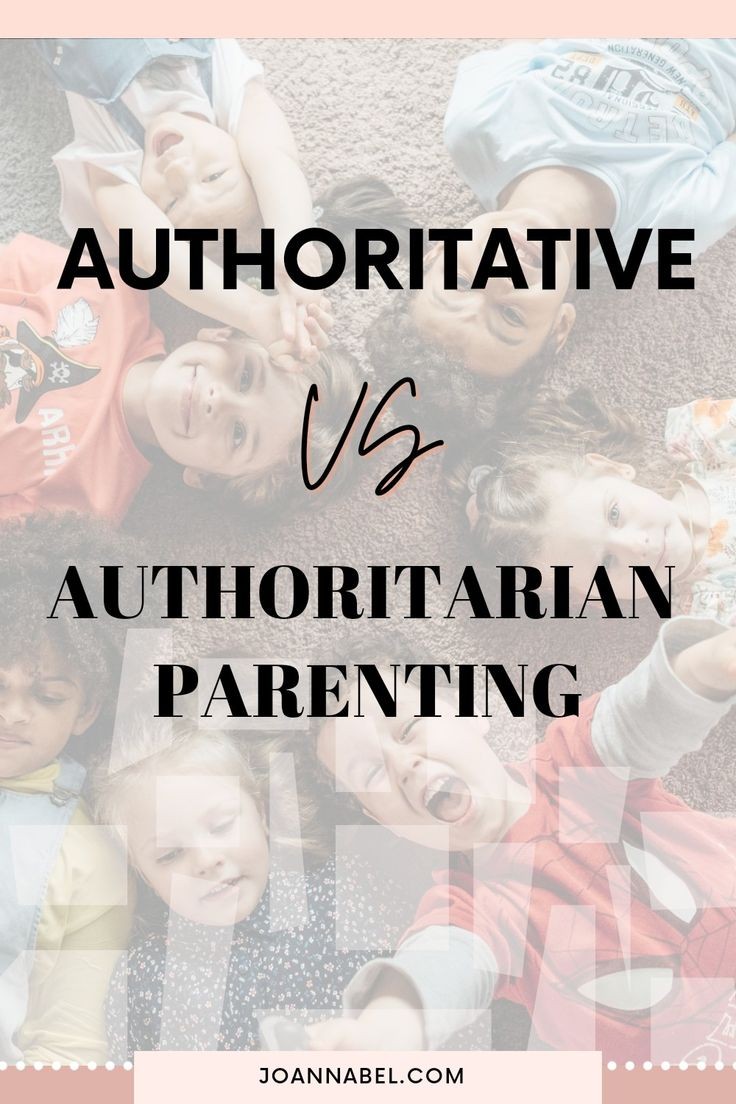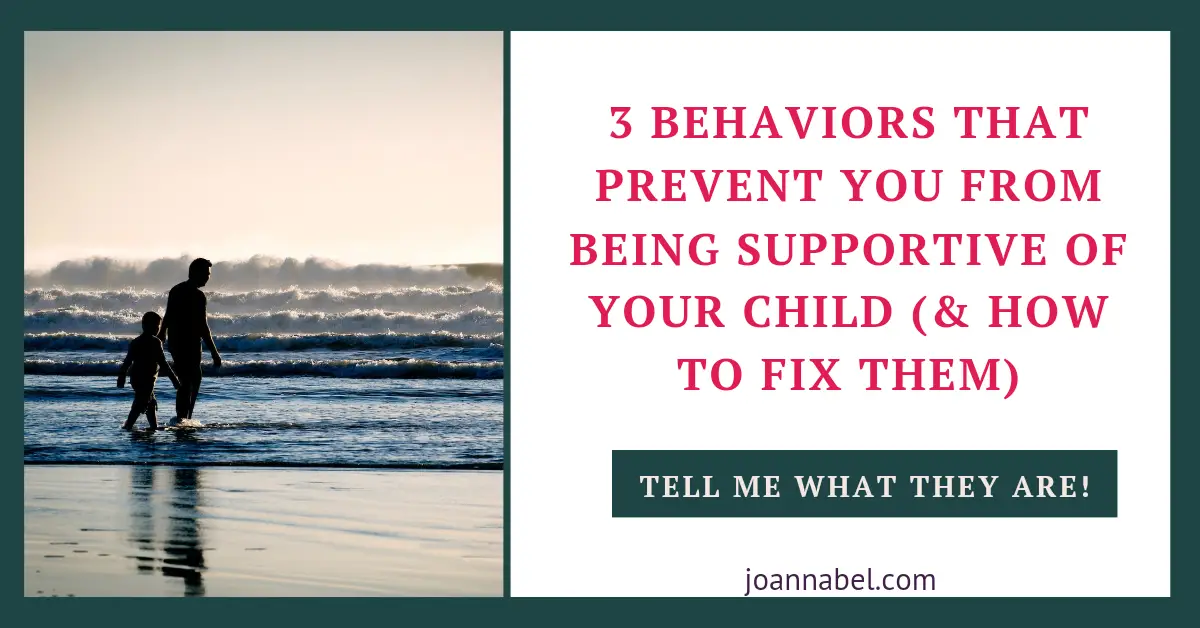Two common parenting styles that often come up in discussions are authoritative and authoritarian parenting styles, which means that we should compare the two (authoritarian vs. authoritative parenting) for better understanding.

Authoritarian VS. Authoritative Parents
While these two parenting styles may sound similar, they have distinct differences in their approach to rules, discipline, and overall child-rearing techniques.
In this article, we will explore what the difference between authoritative and authoritarian parenting style is, and delve into the impact they can have on a child’s development.
By understanding these differences, you can make informed decisions about which parenting style aligns with your values and goals for your child’s upbringing.
If your current style hasn’t brought the results you want, then you know that it’s time for a change.
The good news is that you can.
We can begin our exploration of the topic of authoritarian vs. authoritative parenting style right away.
Note: Although I am a Clinical Social Worker, engaging with this website does not establish a professional social worker-client relationship. The information provided here is for general purposes only and should not be considered professional advice. While we strive to ensure accuracy and reliability, this content is not a substitute for professional guidance. For specific concerns, issues, or situations, it is essential to consult a qualified professional and present your situation. Read the full Disclaimer here.
AUTHORITATIVE VS. AUTHORITAIRAN PARENTING STYLE

We should first talk about what parenting style is so I’ll briefly explain it.
WHAT IS A PARENTING STYLE?
Parenting style refers to the consistent and stable patterns of demands, structure and responsiveness, that parents cultivate in all of their interpersonal interactions with their children. The parents’ practices are dependent on these patterns. That’s why it’s called style – it is perpetual and it’s resistant to events, situations, a child’s age, and developmental phase. This doesn’t mean that it’s unchangeable, it only means that it is constant.
If you need to know more about the 5 parenting styles, I got you – read my post that explores them in great detail: What Are The 5 Parenting Styles: All You Wanted To Know.
Now we can move on to exploring the two styles, so I’ll first talk about the authoritative parenting style.
You may also want to read later:
DIFFERENCE BETWEEN AUTHORITATIVE AND AUTHORITARIAN PARENTING
Let’s explore authoritative versus authoritarian parents:
1) Authoritative Parenting:
- Characterized by nurturing, emotional warmth and responsiveness.
- Sets clear expectations while promoting independence and autonomy.
- Involves children in rule-making discussions to foster understanding and cooperation.
- Balances consistency and flexibility, adapting to individual differences and changing circumstances.
- Encourages independence, decision-making, and responsibility, leading to high self-esteem, better social skills, and academic success.
- Associated with positive emotional effects on children, such as self-expression and secure attachment.
2) Authoritarian Parenting:
- Characterized by strict rules, discipline, and high expectations.
- Prioritizes obedience and conformity, relying on punishment and control to enforce rules.
- Discourages independent thinking and decision-making, which may lead to lack of assertiveness and reliance on external authority figures.
- Can have negative emotional effects on children, including fear, anxiety, and low self-esteem.
- Associated with lower academic achievement and mental health problems, such as anxiety and depression.
- May vary in effectiveness across cultures and may not always lead to negative outcomes.
In summary, authoritative parenting focuses on nurturing and empowering children, while authoritarian parenting emphasizes more control and obedience. Understanding these differences can help parents make informed choices that support their children’s growth and well-being.
This was a short walk through the difference between authoritative and authoritarian parenting if you need a quick answer to this question or concern and now I’ll get into more details for each of these parenting styles.
AUTHORITATIVE PARENTING STYLE CHARACTERISTICS
The authoritative parenting style is often considered a balanced and effective approach to raising children.
Parents who have this style are nurturing, emotionally warm and responsive, and set clear expectations for their children.
They provide guidance and support while also promoting independence and autonomy.
You can read about the 10 benefits of authoritative parenting in my post:
And now we can move on to explain the style in more detail.
#1 SETTING RULES AND UNDERSTANDING
One key aspect of authoritative parenting is the establishment of rules and boundaries.
However, unlike authoritarian parents who enforce rules without question, authoritative parents take a different approach.
They believe in explaining the reasoning behind rules and involve their children in rule-making discussions, which fosters a sense of understanding and cooperation between parent and child.
Authoritative parents grasp the significance of rules, while simultaneously acknowledging the need for open communication and respect of their child’s perspectives and emotions.
By actively involving children in the process of establishing rules, they foster a healthy and supportive atmosphere where children feel listened to and validated.
In this atmosphere a child is a sovereign which is the way to go.
#2 CONSISTENCY AND FLEXIBILITY
Another distinguishing characteristic of authoritative parenting is the balance between consistency and flexibility.
Authoritative parents are consistent in enforcing rules and consequences, but they also understand the importance of adapting to changing circumstances and individual differences.
This means that parents exhibit a consistent approach when setting expectations and implementing discipline, while understanding and valuing the individuality of each child.
They acknowledge that different children may necessitate tailored approaches and are open to adapting their strategies accordingly.
Through this adaptive mindset, they strike a balance between maintaining a firm and nurturing presence in their child’s life.
Check out also:
#3 ENCOURAGING INDEPENDENCE
One of the greatest strengths of authoritative parenting is its focus on fostering independence in children.
Authoritative parents encourage their children to think for themselves, make decisions, and take responsibility for their actions.
They provide guidance and support, but also allow their children to experience natural consequences and learn from their mistakes.
Authoritative parents comprehend the significance of granting children the necessary room for exploration, learning, and personal growth.
This is why they providing kids with a degree of freedom to make decisions within sensible boundaries, actively contributing to the gaining of vital life skills and the nurturing of self-assurance in their children.
If you need more information on the importance of inspiring independence in your child read my post that features 10 reasons why it’s important for a child to be independent.
I’m positive that you’ll find it useful.
Read also:
#4 THE POSITIVE EFFECTS OF AUTHORITATIVE PARENTING
Research has shown that the authoritative parenting style has numerous positive effects on child development.
Children raised by authoritative parents tend to:
- have high self-esteem,
- develop better social skills,
- be emotionally stable, and perform well academically
- be more likely to develop healthy relationships
- exhibit good self-control, and
- have a positive outlook on life, being more cheerful in nature.
So looking at the authoritative parenting characteristics and effects, it’s seen as the optimal parenting style from a child developmental point of view.
Children who have experienced democratic-balanced parenting show what professor Diana Baumrind, the parenting style pioneer researcher described as energetic-friendly behavior.
These children are very self-reliant and optimistic, and they handle stress successfully, plus they orient towards achievement.
But what we shouldn’t overlook is the effect culture can have on parenting styles. And how these parenting styles affect children in certain cultures.
It can be different regarding the outcome of a certain parenting style.
And this also means culture influences parenting too. So different cultures can give different meanings to behaviors/practices.
For instance, certain cultures can define strictness as a discipline which then may result in children being archivers, while others may be more sensitive about it.
Even though Baumrind’s findings hold true across ethnicity and social class, she discovered that authoritarian parenting performed very well with African-American low-income families she followed in one of her studies.
The outcome of this style was girls that were expressing the most assertive and independent behavior.
While this parenting style performed poorly with the rest of the participating children.
In general, kids’ behavior resulting from a democratic or authoritative parenting style is:
- Energetic-friendly.
- Self-reliant.
- Cheerful.
- Achievement-oriented.
But we should acknowledge that most studied have been done in the Western world which means that the authoritative parenting has proven to be effective there.
You can read more about this parenting style in my post that explores it in much more detail:
You may also want to check out:
CHARACTERISTICS OF AUTHORITARIAN PARENTING STYLE
In contrast to the authoritative style, the authoritarian parenting style is characterized by strict rules, discipline, and high expectations.
Authoritarian parents prioritize obedience and conformity, often relying on punishment and control to enforce their rules.
They nurture close relationships with their child but this doesn’t mean that closeness of the family members suggestions emotional bond or emotional warmth, but rather togetherness as a form of control and oversight.
Let’s explore all of this in more detail.
#1 STRICT RULES AND DISCIPLINE
Authoritarian parents believe in maintaining strict control over their children’s behavior.
They set rigid rules and expect immediate compliance without question.
Punishment and negative reinforcement are commonly used to enforce these rules, usually without explanation or discussion.
Moreover, authoritarian parents have a firm conviction in the importance of obedience and conformity and perceive themselves as figures of authority whose set of regulation their children need to comply without hesitation.
If not, they can expect punishment even in a form of retribution in order for a parent to retain control and dominance.
You can see that this becomes an issue as soon as the child approaches adolescence.
#2 LACK OF AUTONOMY AND INDEPENDENCE
One significant drawback of the authoritarian parenting style is the lack of autonomy and independence granted to children.
Authoritarian parents prioritize obedience over individuality, often discouraging independent thinking and decision-making.
Authoritarian parenting can negatively influence a child’s capacity for critical thinking and independent decision-making, resulting in lack of assertiveness, co-dependency, and too much reliance on external authority figures for direction.
#3 AUTHORITAIRAN PARENTING EFFECTS
The authoritarian parenting style can have negative emotional effects on children.
The strict and controlling nature of this style can lead to feelings of fear, anxiety, and low self-esteem in children.
They may struggle with self-expression, have difficulty forming secure attachments, and may be more prone to rebellion in adolescence.
When Diana Baumrind inspected parenting styles she detected the style based on the pattern of child’s behavior and in the case of authoritarian style the children were discontented, withdrawn, and distrustful.
When it comes to mental health of children raised by parents wuth an authoritarian parenting style, they may be more likely to develop anxiety, depression, and other mental health problems.
Baumrind discovered that authoritarian parenting has been associated with poor academic achievement and anxiety-depressive symptoms.
When it comes to child development, children raised by authoritarian parents may struggle with maturity, self-esteem, and independence, as their parents do not encourage them to express their thoughts and feelings or make their own decisions.
That’s because they restrict autonomy to keep all the power in their hands by maintaining high level of control and restrictiveness.
These children:
- can often behave in a conflicted-irritable manner
- tend to be unhappy
- are vulnerable to stress
- lack stability/unstable
- tend to be moody
- can act unfriendly.
As I mentioned, all of this is true for the Western world, but this doesn’t mean that it isn’t for others, it’s just that we need more research on this.
Just keep in mind that culture plays a great role and in some other cultures authoritarian parenting may not give these results and may even bring positive ones.
If you’re interested to know more about this parenting style and determine if it’s yours, read my post dedicated to it:
AUTHORITARIAN VS. AUTHORITATIVE VS. PERMISSIVE PARENTING STYLE
- Authoritarian: Parents who lean this way emphasise obedience and strict rule-following. They set many rules, expect compliance without question, and often rely on punishment rather than explanation. Emotional warmth and flexibility tend to be low.
- Authoritative: This style balances structure with responsiveness. Parents set clear expectations and boundaries, but they also explain, listen, and encourage independence. Their children tend to develop strong self-regulation, social skills, and confidence.
- Permissive: Here, parents are very warm and accepting but offer minimal guidance or consistent limits. They avoid enforcing rules or restrictions, which can leave children without enough structure or support to develop self-discipline.
Read more: AUTHORITARIAN VS. AUTHORITATIVE VS. PERMISSIVE PARENTING STYLE.
FINDING A BALANCE IN APPROACHING PARENTING
While authoritative and authoritarian parenting styles have distinct differences, it’s important to remember that parenting is not black and white.
Plus, many parents tend to have different parenting style so then the child may be exposed to different influences.
Regardless, discovering how to balance between control and independence, or authority and autonomy is crucial when it comes to raising children.
It is essential to establish limits and set expectations while also giving children enough freedom to make their own choices according to their age and level of socioemotional maturity, as well as to form, explore, and express their own identities.
You may be interested to check out also:
If you found the information on the blog helpful & inspirational and you feel like giving back, you can do it by clicking the donate button after entering amount you’re comfortable with. I’ll use it to create and deliver more useful content and resources like this. Thanks for your precious contribution!
IMPORTANT REMINDER RELATED TO PARENTING STYLES AND CULTURAL CONTEXT
Now that you have gained an understanding of the distinction between authoritarian and authoritative parenting styles, it’s essential to recognize that this concept serves as a framework for guidance.
It’s important to acknowledge that within a family, parents often have different parenting styles, and at times, these styles may even clash.
Due to the variation in parenting styles, it’s difficult to determine the specific effects they will have on a particular child.
To truly comprehend the impact of each parent’s characteristics and behaviors on a child, a closer examination of their relationships and family dynamics is necessary.
In some instances, children may actually benefit more from the diverse styles present in the family rather than if they were all the same, especially when a particular style is not beneficial for the child.
Additionally, it’s crucial to consider cultural differences, as most research on parenting styles has predominantly focused on the Western world, which adheres to a specific set of values that may differ from other parts of the world.
As we assign meaning to characteristics, events, behaviors, and treatment based on our values and internal compass, the perception of certain parenting style as positive or negative may vary.
For instance, strictness and togetherness can be viewed as either positive and nurturing in one culture or as undesirable in another.
You can often see how strictness is linked with positive discipline or togetherness being marked as “solidarity.” Or you can see how togetherness is seen as a treat to individuality and autonomy. All depending on the cultural context.
It’s important to note that none of this implies that having particular parenting style is irrelevant.
Rather, it emphasizes that we need to understand more about the family dynamics, cultural context, individual experiences and preferences or the meaning ascribed by the person involved (the child in this situation).
Latest Posts:
- How To Help Cultivate Your Child’s Interests in Art

- The Bedroom Door: Why Privacy for Teens Isn’t Optional

- The Importance of Play in Child Development

- 5 Hobbies That Will Help You Connect With Your Teens

- A Guide to Balancing Parenting Roles After Divorce

- Gifts for Your Teenager That They’ll Actually Enjoy

FINAL THOUGHTS ON AUTHORITARIAN VS. AUTHORITATIVE PARENTING
Parenting styles play a vital role in shaping a child’s development and well-being.
The authoritative parenting style, with its focus on nurturing, clear expectations, and fostering independence, has been shown to have positive effects on children.
On the other hand, the authoritarian style, with its strict rules and emphasis on obedience, can have negative emotional impacts, unless strictness has a positive connotation.
As parents, it is crucial to evaluate our own parenting style and make adjustments as needed.
The goal is to create a nurturing and supportive environment that allows children to thrive while also providing structure and guidance, so if your parenting style is able to provide this, it doesn’t matter how we call it.
By understanding the differences between authoritative and authoritarian parenting, we can make informed choices that align with our values and promote our children’s growth and fulfilment.
Remember, parenting is a journey of growth and learning, so it’s never too late to adapt and evolve as a parent.
Embrace the opportunity to create a positive and empowering parenting experience for both you and your child.
I’ll stay positive that things will work out for you and I’ll see you in my next post! Before you go, check out:










Leave a Reply